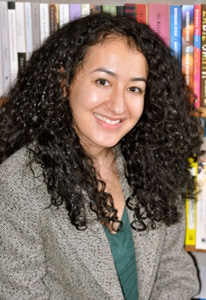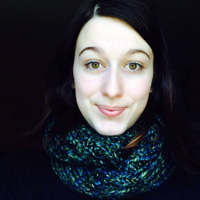The Shape of Voices: Senica Maltese
in Conversation with Tajja Isen

Malahat fiction board intern Senica Maltese talks with 2014 Open Season Fiction Award Winner, Tajja Isen, about academia, psychoanalytic theory, and how she views the writing life one year after her win.
Click here for full details on submitting to this year's Open Season Awards!
First of all, let me just say that I’m delighted to be able to talk to you about "The Anxiety of Influence" and your year since winning The Malahat Review’s Open Season Award!
Thanks so much! I’m delighted to speak with the Malahat again.
Since winning last year's award in the Fiction category, have you re-read the story and, if so, what do you think of it now that it’s had time to sit?
I skimmed it in excitement when the journal first came out, but I haven’t sat down to reread it tip to tail. Since the win, most of my engagement with the story has been through conversation with its readers, whose responses have been a delight to hear. It’s been a privilege to re-encounter the piece this way, and it’s made me a proud writer to be evoking some of these reactions.
In your last interview with the Malahat, you mentioned that the academic voice of this piece came easily for you. Have you found that you’ve favoured academic voices in your writing since your win?
They’ve popped up in the odd character, but not at all as a general trend. I’ve been really drawn to polyphony, lately—to differences in age, background, speech patterns, level of self-awareness, and how those factors can shape a voice. I had a member of my writing group ask me recently if I ever write anything that sounds like a woman in her early twenties (funnily enough, that’s the one I’m never sure I’ve gotten quite right). Maybe it comes from working in cartoons, but I love composing and nailing a new, unusual voice. That’s always the point when a story really takes off for me.
What originally made you interested in looking at the tensions of co-parenting from the lens of academia? Have your views evolved at all ithis past year?
I knew I wanted to write a story about parenting; I had a great deal of psychoanalytic theory clattering around in my head from a course I was taking at the time, and the two seemed like a happy marriage (or, at the very least, happier than the one in the story). My interdisciplinary interests in literature and psychoanalysis certainly manifested themselves through the co-parenting in the story, though it was more a matter of writing to serve the characters than to serve a particular theoretical standpoint. To that end, I haven’t experienced any evolution of my views, because the story was never driven by a thesis to begin with. I’m in more or less the same place—loving literature, loving Freud, loving the way the two continue to speak to one another.
What about your writing or creative process has changed since winning the Open Season Award? What has stayed the same?
My creative process has stayed pretty much the same. I still dive into stories without much of a plan and revel in the process of discovery as I go along, and I’m still an obsessive reviser. If anything’s changed, it’s that I expect a higher standard of work from myself. While the win was a wonderful form of recognition, it was also an implicit challenge to maintain and even surpass that level in myself, a challenge that I enjoy facing as I continue to write.
How has winning this award affected your creative psyche? Have you noticed any shifts in your career as a writer, or your life in general since winning?
Winning this award was extremely nourishing to my creative psyche, not least because it was my first publication. It nudged open the door in my head marked "writer" and invited me to try squeezing through a bit further. I’ve since become even more serious about my writing. I sit down in front of the computer with greater conviction and regularity, and submit pieces with more confidence, which are all wonderful gifts. I guess that would be the biggest life change, too—that I try to spend a fraction of every day working on my fiction, and look forward to that time each day.
At the end of your last interview with the Malahat you mentioned a desire to pursue law school. Is that still a desire of yours? How do you imagine balancing your creative endeavours (song-writing, fiction, and voice acting) with a demanding academic program?
Yes, that’s still a very real desire of mine; I’m in the midst of applications at the moment. I’ve been fortunate to lead a life in which I’ve frequently been asked the "how do you balance it" question and, with the aid of luck and hard work, will continue to be asked. The short answer is "very carefully." I believe that if something is important enough to you, you will make the time for it, even if the demand on that "something" is as intense as studying the law. Fielding did it. So did Kafka. I read recently that "law isn’t a job; it’s a license to do many kinds of jobs," which really resonated with me. I’m at my happiest when I’m fulfilled both creatively and analytically, and I believe that studying the law will feed both of these streams, even as I continue with my artistic pursuits.
What are you currently working on? Can we look forward to any more fiction coming in the future?
I have a story forthcoming in The New Quarterly, which I’m very excited about. I have several pieces under consideration elsewhere, and I’m revising a couple more stories, with the intention of sending them out soon. I’ve also begun working on a novel, which has been a thrilling experience thus far.
* * * * * * * *










